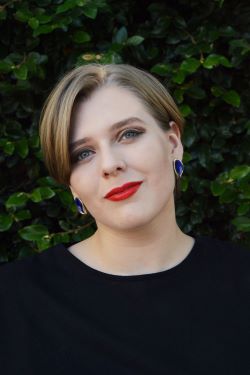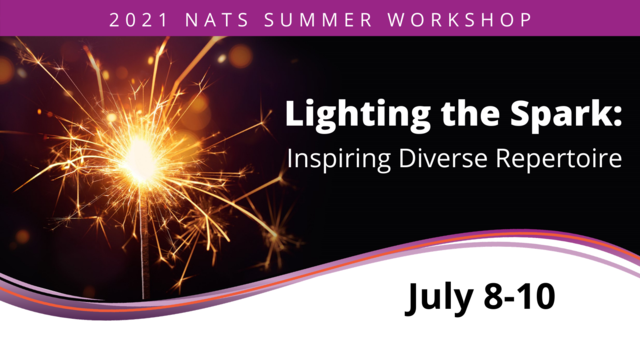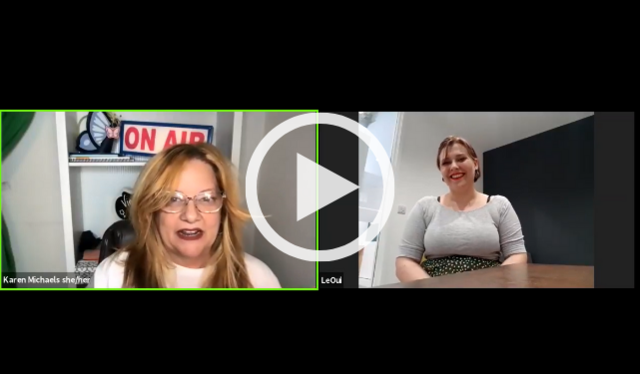What's New > Learn about Afrikaans art song and diction at our Summer Workshop
 |
LeOui Janse van Rendsburg
|
At our Virtual Summer Workshop, LeOui Janse van Rendsburg will present two sessions: “Afrikaans Art Song: Contexts & Repertoire” and “Afrikaans Diction Workshop.”
In the first session, Rendsburg will provide background and historical information about the genre of Afrikaans art song. She will share the most important principles of Afrikaans diction and language in the second session. The NATS Virtual Summer Workshop is July 8-10. See schedule and details.
Thrilled you will be joining us! Tell us a little about yourself and about your workshop sessions.
Thank you much for having me! I’m absolutely thrilled to be here as well, and really honoured to be given the opportunity to share information about repertoire which is so close to my heart.
My name is LeOui and I’m a native Afrikaans speaker and classical singer. I did my undergraduate and Master’s degrees at the University of Cape Town, followed by my Graduate Performance Diploma in Voice at the Jacobs School of Music where I studied with Heidi Grant-Murphy. I’m currently living in London, where I’m busy doing my PhD on the topic of Afrikaans art song at the Royal Academy of Music.
The first workshop session is designed to give you a broad view of the historical and cultural background of the genre, as well as introduce some key composers and their works. I will aim to give a stylistic overview of the existing repertoire as well as to analyse a few selected works. In the diction workshop, I will give a brief explanation of the development of the language and its historical and cultural influences. The main focus of the session will be introducing some of the most basic principles in Afrikaans diction and grammar. I will also touch on the literary history of Afrikaans as it pertains to poetry and highlight a few of my favourites as examples of pronunciation and as a chance for some practical participation for anyone who wants to try their hand at reading them.
Our workshop theme is “Light the Spark: Inspiring Diverse Repertoire.” Why do you feel it is important for singing teachers to branch out and try new repertoire — especially from diverse backgrounds and genres?
I think it is so important to keep exploring new repertoire, because you never know when you will stumble on something that expresses something that you have always felt or understood, but never found a way to put it into words or express it otherwise. Most of our lives as creatives is focused on creating objects or experiences that will make others understand is better and exploring repertoire like this, not only empowers you as an artist, but also as a human being.
I also can’t stress the importance enough of exploring repertoire from diverse backgrounds and genres, because it offers new and alternative viewpoints and gives voice to previously unexpressed or unheard opinions or feelings. And it could very well be your opinion or feeling which a new repertoire discovery manages to give a voice to.
What kind of feedback do you hear from singers after they start learning and studying Afrikaans art song? Especially from those who may be less familiar with the genre?
To be honest, I don’t know that many international singers learning Afrikaans art song. I was privileged to work with an American singer at IU who agreed to sing one of my dabblings as a composer, and I think he did a very good job.
I think the main challenge that I have noticed that people have when singing Afrikaans but he/she/they isn’t a native Afrikaans speaker, is that it is very hard for them to capture the darkness in the vowels. Afrikaans has much darker sounding vowels than German, for example, and most non-native speakers tend to underestimate just how dark the vowels are.
From a technique point of view, it is of course important to keep a certain brightness in one’s tone and not to artificially darken one’s voice. So it does create a challenge when you have to find the balance between achieving the correct vowel colour, but not compromising on your vocal health. I’ve found similar challenges when singing in Russian myself.
If a workshop attendee is eager to start learning more today about Afrikaans art song as well as Afrikaans diction/language, what resources do you suggest?
So, this is a bit of a tricky question, because one of the main reasons I am doing my PhD on this topic is because there is so little written on the genre. And a lot of the resources that do exist, tend to be written in Afrikaans. Overall, there is not a lot of official sources that are all that helpful.
The best historic overview of Afrikaans art song is a book written by Jan Bouws (‘Solank daar Musiek is…’), however it is in Afrikaans and there is no translation thereof as of yet. It’s also a bit dated and doesn’t include contemporary composers. I am hoping that in the process of completing my PhD, I will be able to provide some more of the help that is necessary as well as to hopefully translate some of the existing documents so that it is accessible to everyone.
In the meantime, there are a couple of things I would suggest. Firstly, Dr. Bronwen Forbay wrote a short performance guide to Afrikaans art song as her dissertation for her DMA. This is available online as far as I know and it includes a bit of background on some composers as well as some diction pointers. Most of the recordings of Afrikaans art song that are available have been sung by native Afrikaans speakers. So you can listen very carefully to their diction and compare your own to it. This is a bit of a make-shift solution, but I’ve done it before when I had no access to a Czech coach and had to learn Cigánské Melodie. The problem with this is that relatively few of the works’ recordings have been posted online or are for sale.
The University of Pretoria is probably the best place to source almost all of the scores and recordings because they have almost everything in their catalogue. However, the issue that I have also been experiencing while living abroad, is that during COVID-19, the university libraries are not doing any inter-library loans and unfortunately South African libraries are a bit behind when it comes to having digital copies. So far, I have relied very heavily on some very patient and kind people who have been able to go there physically and make copies for me.
It’s a lot easier to source repertoire by living composers as they usually are very happy for their pieces to be performed and in some cases would happily share their scores with you for free or for a very reasonable price.
If anyone is interested in learning Afrikaans repertoire or learning more about it, I am always happy to help. The South African music world is very small and I still have many professional contacts and family members who will go to libraries for me if I asked them nicely. So, I am happy to be a point of contact should anyone need it.
Of the genre, do you have a favorite composer or two, or a set of art songs?
Oh, it is very hard to choose a favourite, because there are a lot of the songs that are special for different reasons. I would always be leaving something off my list when I answer this question, but I really love singing Pieter de Villiers’s Sewe Boerneefliedjies. The poetry is so colourful and characterful and it is sensitively set. I also deeply relate to the thematic material on a personal level. Arnold van Wyk’s Vier Weemoedige Liedjies, and in particular, ‘In die Stilte van my Tuin’, is just lush and gorgeous. I have sung quite a few different Hendrik Hofmeyr songs and have fallen in love with each one. His songs are very well written for voice and very gratifying to sing.
Are you looking forward to attending any other sessions at the Virtual Summer Workshop?
I’m going to try and attend as many of them as possible! But I would say Mutsumi Moteki & Kumiko Shimizu’s Introduction to Japanese Art Song has caught my eye in particular.
Our Virtual Summer Workshop is July 8-10. Read more about Rendsburg, her fellow workshop presenters, and view the full schedule.
Online registration closes June 15. Contact the NATS office directly with any registration questions.
Recently, Rendsburg was our featured guest on NATS Facebook Live. View here or click below to watch.
NATS is also pleased to offer the Mentored Teaching Experience as part of the Virtual Summer Workshop.
For a $75 fee, participants secure a session with one of our mentor teachers, which offers mentees a chance to gain valuable feedback and re-energize their teaching. Please note: all participants must also register for our Summer Workshop.



